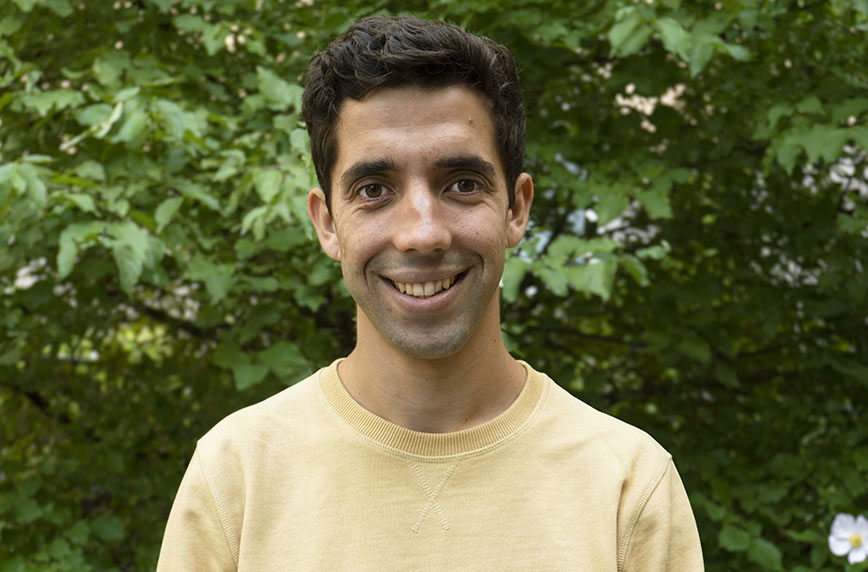Àlex
Àlex comes from sunny Barcelona, by the Mediterranean Sea. He got a bachelor's degree in Telecommunications Engineering at Universitat Politècnica de Catalunya (UPC). When not in university, you will find him exploring Stockholm, going for a fika, trying out exotic recipes, hiking or reading.

Why did you choose this master's programme at KTH?
After graduating, I knew I wanted to continue studying. I also knew I wanted to experience the Nordic lifestyle at some point in my life. So why not come to do my master's in Sweden? Choosing a university was easy: KTH is one of the most recognised technical institutions in the Nordic countries, and the syllabus was what I was looking for. I chose this master's programme mainly for its Data Science track, the one I am minoring in. The rare and exciting combination of Distributed Systems and Data Science blends two topics I feel strongly passionate about. On top of that, once I got here, I discovered that Stockholm is a vibrant, calm and gorgeous city.
What are the best aspects of your programme?
The compelling mixture I just talked about gives you a broad overview and a strong background for careers in Data Science, Data Engineering or pure Distributed Systems design. Upon choosing the other track (Software Engineering), you will get a strong background in software development (both high- and low-level) in a myriad of programming paradigms.
There are quite a few electives to choose from, a wide variety of courses to round up the syllabus. This allows you to specialise in whatever you feel most strongly about.
What are some of your favourite courses so far?
I will try to keep the list short, but the truth is that there have been many interesting courses. I would like to highlight three of them.
Advanced Distributed Sytems is one of the most challenging courses in the programme and arguably the most theoretical one (in a very hands-on programme overall). I enjoyed a lot how we worked from the very basics abstractions of distributed systems up to some pretty complex topics. It was all rounded by short bi-weekly programming exercises to put into practice every topic we were exploring and a final project to bring it all together.
Scalable Machine Learning and Deep Learning is part of the Data Science track and gives a brilliant overview of what Machine Learning is today, starting from zero and covering all relevant topics in the field. As most courses at KTH, it has a practical approach, digging into the most used libraries for distributed machine learning nowadays. An open-topic final project gives you the freedom to apply the concepts in the course to a topic you feel passionate about.
Last but not least, Deep Learning In Data Science is not part of my programme but rather an elective for me. I got to code from scratch deep architectures in it, gaining invaluable knowledge on how backpropagation works. Once more, an open-topic final project gave me the freedom to invest time in replicating a paper on GANs I was really interested in.
How would you describe your time at KTH so far?
After a year here, I am convinced I took the right decision by choosing KTH and moving to Stockholm. Although corona has been around, I managed to meet a lot of new people from all over the world, get involved in student associations and even worked part-time as a free tour guide. Also, courses have been challenging, fun and exciting. As you can see, it has been an intense first year in Sweden, and I loved it. I cannot wait for the second year to start!
What do you want to do after graduating?
I would like to stay in Sweden for a few years and work in the data science field, hopefully in a fast-growing startup. Luckily, last summer, I already did an internship in a company like this, and I tremendously enjoyed it.
I feel Stockholm is great for someone looking for this. Stockholm currently has the highest number of tech unicorns per capita in the world except for Silicon Valley, meaning that the startup ecosystem is healthy and powerful. Everyone knows about Spotify, King, Skype or Klarna, but there are also newcomers like Northvolt, Kry or Einride.
On top of that, Swedish work culture aligns perfectly with my own values. They are hard-working and serious when needed, but also playful and caring — work-life balance, amazing working environment, fika time with your team... Oh, if you still don't know what fika is, don't worry — you'll discover soon enough.
